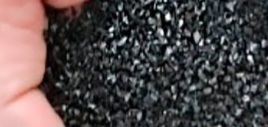Activated charcoal is a fine black powder made from bone char, coconut shells, peat, petroleum coke, coal, olive pits, or sawdust. The charcoal is “activated” by processing it at very high temperatures that change its internal structure, reducing the size of its pores and increasing its surface area. This treatment results in a charcoal that is more porous than regular charcoal. Here’s what activated charcoal does to your body and how it can be beneficial in various health contexts.
1. Toxin Removal
Activated charcoal is best known for its role in toxin removal. It can adsorb a wide variety of drugs and chemicals, preventing their absorption in the body. This property makes it a popular treatment in cases of poisoning or drug overdoses. The charcoal binds to toxins and chemicals, which are then naturally expelled by the body. It is important to note that activated charcoal should only be used in these scenarios under medical supervision.
2. Alleviation of Gas and Bloating
Activated charcoal can bind with intestinal gases, reducing bloating and discomfort. Some studies suggest that activated charcoal may effectively reduce gas production following a gas-producing meal. It’s often taken as a supplement before meals to help alleviate these symptoms.
3. Water Filtration
Activated charcoal is a key component in many water filtration systems. It can trap impurities in the water, including solvents, pesticides, industrial waste, and other chemicals, making it safer to drink.
4. Skin Care
Due to its ability to absorb toxins and bacteria, activated charcoal is used in various skincare products. It is believed to draw impurities from the skin, helping to treat acne and improve overall skin complexion. It’s commonly found in cleansers, face masks, and scrubs.
5. Oral Health
Activated charcoal is sometimes used in oral health products like toothpaste. It is purported to help remove stains from the teeth, contributing to a whiter smile. However, it should be used cautiously as it can be abrasive and might damage the enamel if used too frequently.
6. Cholesterol Management
There is some evidence suggesting that activated charcoal can help lower cholesterol levels. It does this by binding cholesterol and cholesterol-containing bile acids in the gut, preventing their absorption into the body.
Precautions and Side Effects
While activated charcoal can be beneficial for various health-related uses, it’s not suitable for everyone and can interact with certain medications, reducing their effectiveness. Here are a few precautions:
- Medication Interaction: Activated charcoal can adsorb and inhibit the absorption of certain medications, such as those for heart disease and depression, as well as supplements. It should be taken at least one hour before or two hours after medications and under the guidance of a healthcare provider.
- Dehydration Risk: It can lead to dehydration if adequate water is not consumed alongside it.
- Constipation and Black Stools: It can cause constipation and will make stools black, which is generally considered harmless but can be alarming.
Due to the potential for significant interactions and side effects, it’s recommended to use activated charcoal under the guidance of a healthcare professional, especially in medical or emergency scenarios. If considering it for general health benefits like teeth whitening or skin care, it’s typically safe to use as directed on the product labeling.
